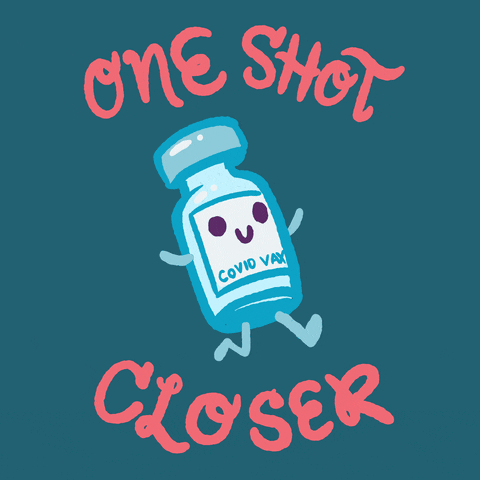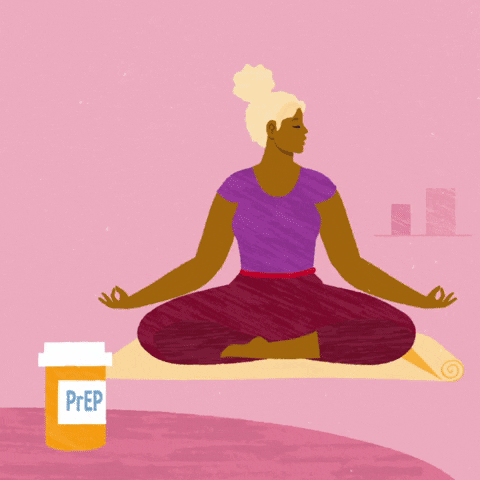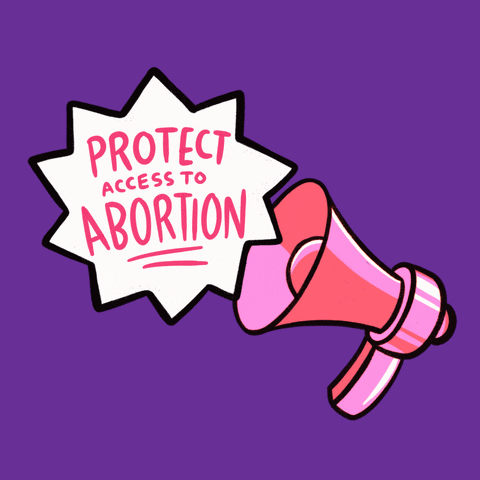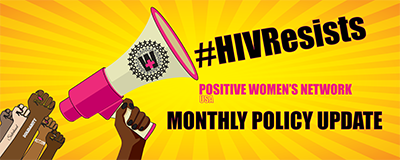Like these policy updates? Subscribe for bi-monthly emails from PWN in your inbox!
In this month’s MPU
- Celebrate and Honor Black Women with PWN
- COVID-19 Updates
- Demanding Better Updates
- Healthcare Access
- Economic Justice
- Reproductive Health, Rights, Justice
- Ending Criminalization
- LGBTQ+ Rights, Safety, and Justice
- Ending Violence
PWN’s 2nd Annual Celebrate and Honor Black Women
 Join PWN as we Celebrate and Honor Black Women in the HIV Movement (CHBW) on March 12, 2022! Launched in 2021, PWN created this national day of action in recognition of the incredible labor and innovation that Black women, cis and trans, have always contributed to the HIV community, and how they were often overlooked, even harmed, within HIV Institutions. Now, every year we ask our allies and movement partners to join us by signing on to support Celebrate and Honor Black Women. What can you do for Black women in your organization?
Join PWN as we Celebrate and Honor Black Women in the HIV Movement (CHBW) on March 12, 2022! Launched in 2021, PWN created this national day of action in recognition of the incredible labor and innovation that Black women, cis and trans, have always contributed to the HIV community, and how they were often overlooked, even harmed, within HIV Institutions. Now, every year we ask our allies and movement partners to join us by signing on to support Celebrate and Honor Black Women. What can you do for Black women in your organization?
To participate in Celebrate and Honor Black Women, we encourage partner organizations and supporters:
- Add your name to commit to celebrating and honoring Black women’s leadership and contribution to our movement
- Tell us what you will do for your Black women staff, clients, constituents, stakeholders, in recognition of CHBW
- Attend our feature event: Black Joy & Resilience Town Hall on March 15th with a stellar line-up of powerful and influential Black women
- Learn about our 20 Black HIV Movement Mother honorees
- Black women are invited to send us art submissions to be featured during the Town Hall event
COVID-19 Updates
 As COVID-19 cases continue to drop nationwide, mask mandates and vaccination requirements are easing in many states. However, the Biden administration is considering further legislation that would provide additional funding for pandemic relief – especially for COVID-19 testing, treatment and vaccination in an effort to stay ahead of the virus.
As COVID-19 cases continue to drop nationwide, mask mandates and vaccination requirements are easing in many states. However, the Biden administration is considering further legislation that would provide additional funding for pandemic relief – especially for COVID-19 testing, treatment and vaccination in an effort to stay ahead of the virus.
Although mandates are relaxing, the U.S. Centers for Disease Control and Prevention (CDC) continues to recommend the full series of COVID-19 vaccination, especially for people living with HIV, regardless of CD4 count or viral load. The CDC also recommends that all pregnant and lactating people be vaccinated for COVID-19 as well as for influenza and pneumonia – which can all be administered during the same visit.
It is recommended that immunocompromised people living with HIV age eighteen and older who got the Moderna or Pfizer vaccine receive an additional booster, a fourth shot, at least five months after the third shot. People living with advanced untreated HIV who do not have COVID-19 and were not recently exposed to COVID-19 are recommended to receive tixagevimab and cligavimab as pre-exposure prophylaxis for COVID-19.A CDC study released in the Morbidity & Mortality Weekly Report shows COVID-19 vaccination rates in the state of NY are lower among people living with HIV, especially Black people, than the general adult population. People living with HIV who are in HIV care are more likely to be vaccinated against COVID-19 than people living with HIV who are not engaged in care, reinforcing racial inequities.
Demanding Better Updates
In July 2021, the US People Living with HIV Caucus released Demanding Better: An HIV Federal Policy Agenda by People Living with HIV. The agenda details concrete recommendations for the executive branch and Congress to address shortcomings in the National HIV/AIDS Strategy (NHAS) and the federal Ending the Epidemic initiative (EHE). The Demanding Better Policy Agenda focuses on five broad issue areas:
- Concretely elevating meaningful involvement of people living with HIV and disproportionately impacted communities in the HIV response;
-
Creating an affirming human rights environment for people living with HIV;
-
Addressing racial and gender inequities;
-
Attending to sex workers and immigrants within the response and
-
Affirmatively committing to improve quality of life and care for people living with HIV.
Federal Agencies Working on NHAS Implementation Plans & Quality of Life Developmental Indicator

The U.S. National HIV/AIDS Strategy (NHAS) – a federal document signed and sealed by the President and released in December of 2021, provides key stakeholders with a roadmap for strategically reducing the impact of, and ultimately ending the HIV epidemic in the United States.
Once released, federal agencies have a 90-day period to work on implementation plans in accordance with NHAS recommendations. We are currently in that period. The White House Office of National AIDS Policy (ONAP) convened the National HIV/AIDS Strategy Federal Implementation Workgroup (NHAS FIW, or “the workgroup”), a diverse group of federal agencies and departments implicated in the NHAS, to begin developing an implementation plan.
In response to demands from networks of people living with HIV, a subgroup of federal agency representatives has convened to develop a set of indicators that will measure quality of life for people living with HIV. This is a major step forward. To date, NHAS measurements of “success” for people living with HIV focused on viral loads, medical appointments, and prescriptions filled. Networks of people living with HIV continually demanded the federal HIV response include accountable measures on well-being, including mental health, housing and food security, access to quality, gender- and culturally-responsive healthcare, employment opportunities, and more. Networks have also asked to partner with federal agency leaders in developing these metrics and indicators.
NIH releases announcement for meaningful involvement on the EHE
The National Institutes of Health (NIH), the U.S.’s medical research agency, recently released a supplemental announcement highlighting opportunities for meaningful involvement of networks of people living with HIV on Ending the HIV Epidemic (EHE). NIH’s announcement recommends working with existing networks such as PWN and the U.S. People Living with HIV Caucus (The Caucus) to support community-based solutions by proposing projects with community partners in the EHE jurisdictions.
Health Care Access
Build Back Better Effect on People Living with HIV in Non-Medicaid Expansion States
Medicaid currently serves 76.7 million Americans with health care insurance. In non-Medicaid expansion states, if a person’s income is below the federal poverty line, but not low enough to meet the state’s Medicaid income requirements, they fall into a “coverage gap.” People in coverage gaps are not eligible to receive Medicaid benefits, nor are they eligible to receive a discount on private marketplace health insurance plans – leaving many uninsured. Currently, twelve states have not expanded their Medicaid programs, leaving 20% of people living with HIV in those states uninsured, compared to 6% of people living with HIV uninsured in Medicaid-expanded states. A provision in the Build Back Better Act (BBB Act) seeks to close the coverage gap by providing a low-cost marketplace plan for those who are 100% below the federal poverty line yet ineligible for Medicaid in their state. The BBB Act also encourages Medicaid expanded states to continue with their expansion programs. A recent study shows on average 23% of non-elderly people living with HIV in those 12 non-Medicaid expanded states could become eligible for Medicaid if it was expanded under the BBB Act.
Community-Based Organizations Are Urging Biden to Create a National PrEP Grant Program
 PrEP is a pre-exposure prophylaxis that comes in the form of daily pill or an injection and has been proven to effectively reduce the risk of acquiring HIV through sex. Over one-hundred community organizations signed a letter asking the Biden administration to create a national PrEP program as a preventative measure. The letter calls for funding allocations in the fiscal year 2023 budget to ‘establish and fund a national PrEP grant program to increase awareness and access to PrEP and related services.’ The impetus, letter signatories point out, include the slow rollout and racial inequities in access to PrEP, especially in Black communities.
PrEP is a pre-exposure prophylaxis that comes in the form of daily pill or an injection and has been proven to effectively reduce the risk of acquiring HIV through sex. Over one-hundred community organizations signed a letter asking the Biden administration to create a national PrEP program as a preventative measure. The letter calls for funding allocations in the fiscal year 2023 budget to ‘establish and fund a national PrEP grant program to increase awareness and access to PrEP and related services.’ The impetus, letter signatories point out, include the slow rollout and racial inequities in access to PrEP, especially in Black communities.
New York Proposed Medicaid Carve Out Could Be Harmful to Black People Living with HIV
On National Black HIV/AIDS Awareness Day, HIV activists gathered at the New York State Capitol demanding Governor Hochul repeal former Governor Cuomo’s Medicaid pharmacy carve-out set to begin on April 1, 2023. This carve-out would bring about challenges to facilities funded by 340B money, a national program that allows “safety net providers” to use surplus dollars saved from purchasing discounted drugs to provide essential services for the communities they serve. The new Medicaid pharmacy carve-out would instead give these surplus dollars to the state, rather than to the providing institutions, limiting providers’ ability to deliver services to the 2.3 million New Yorkers – 90% of them low-income and 70% people of color, who rely on these services.
Economic Justice
Prices are Up While Wages are Down

Although 6.6 million jobs were added during President Biden’s first year in office – a record for any president, inflation is at a 40-year high. The consumer price index rose 7.5% in 2021, making it the highest annual increase since 1982, with food prices up 7% on average and oil and gas prices up by more than a quarter. Meanwhile, data continues to show severe wage inequality for people of trans experience. Trans and gender non-conforming people have been ranked the lowest paid LGBTQ full-time workers in the US, with transmen earning 70 cents for every dollar a cisgender worker earns, and transwomen earning 60 cents on the dollar.
Giving Mothers Money Increases Baby’s Brain Function
There are nearly 11 million children living in poverty in America, with those from Black, Latinx, and Indigenous families experiencing the highest levels of childhood poverty. According to a study conducted by the Proceedings of the National Academies of Science, providing low-income mothers with an unconditional cash stipend of $333 per month can result in their children displaying increased brain activity. While previous research has linked poverty in childhood to differences in brain structure and function, the 1,000 children participants showed stronger high-frequency brain activity including improved social, emotional, cognitive, and language skills. One of the provisions of the Build Back Better Act (which continues to be stalled in the Senate) is the enhanced Child Tax Credit, which provided families with up to $3,600 annually per child and had an incredible impact on child poverty rates. The program expired in December 2021 but is included in the BBB Act, and is one of the stated reasons Senator Joe Manchin opposed the Act. Passing Build Back Better would ensure that the economy continues to grow, jobs continue to be created, and families in need are receiving assistance to sustain their lives.
Reproductive Health, Rights, and Justice
Title X Funding is Back to Pre-Trump Standard
 Title X is a family planning federal grant program that provides regulations and funding for family planning services including discussions on reproduction, delaying and preventing pregnancy, pregnancy testing, infertility services, STI prevention education, screening, and treatment, and more. During the Trump-era, a Title X provision on abortion was modified so that clinics receiving Title X funding were prohibited from referring patients to abortion providers. The Biden administration got rid of that provision after a federal appeals court upheld the changes, reverting the Title X program back to the way it was run for 19 years, before the Trump administration changed it in 2019.
Title X is a family planning federal grant program that provides regulations and funding for family planning services including discussions on reproduction, delaying and preventing pregnancy, pregnancy testing, infertility services, STI prevention education, screening, and treatment, and more. During the Trump-era, a Title X provision on abortion was modified so that clinics receiving Title X funding were prohibited from referring patients to abortion providers. The Biden administration got rid of that provision after a federal appeals court upheld the changes, reverting the Title X program back to the way it was run for 19 years, before the Trump administration changed it in 2019.
States New Laws Makes It Easier to Obtain Birth Control Pills
Illinois passed a new law allowing pharmacists to dispense birth control pills without a doctor’s prescription. HB135 allows a trained pharmacist, overseen by a physician, to dispense birth control pills once they have completed a risk assessment and education on contraceptives with the patient. Similarly, North Carolina’s HB96 went into effect at the start of this month, allowing people to purchase birth control pills and patches at local pharmacies after a consultation with a pharmacist.
This method of contraception access is important especially for folks in rural areas who may have to travel far to obtain a doctor’s prescription for something that could easily forego the prescription process. Illinois and North Carolina join over a dozen states that allow pharmacists to prescribe contraception.
Ending Criminalization
HIV Criminalization Awareness Day
 Save the date! February 22, 2022 is the Inaugural HIV Is Not a Crime Awareness Day (HINAC Day)! Led by the Sero Project, Elizabeth Taylor AIDS Foundation, activists and other HIV advocacy groups, HINAC Day aims to bring awareness to HIV criminalization in the US. HIV criminalization refers to laws, policies, and practices that target people living with HIV and punish them based on their HIV positive status. HINAC Day will shed a much needed light on the history of HIV criminalization laws and their impacts beyond the justice system on people living with HIV, and highlight the work to reform, dismantle, and end HIV criminalization. To support HINAC Day, register for the HINAC Day kickoff event here and read Sero’s letter to take action to end HIV criminalization laws here.
Save the date! February 22, 2022 is the Inaugural HIV Is Not a Crime Awareness Day (HINAC Day)! Led by the Sero Project, Elizabeth Taylor AIDS Foundation, activists and other HIV advocacy groups, HINAC Day aims to bring awareness to HIV criminalization in the US. HIV criminalization refers to laws, policies, and practices that target people living with HIV and punish them based on their HIV positive status. HINAC Day will shed a much needed light on the history of HIV criminalization laws and their impacts beyond the justice system on people living with HIV, and highlight the work to reform, dismantle, and end HIV criminalization. To support HINAC Day, register for the HINAC Day kickoff event here and read Sero’s letter to take action to end HIV criminalization laws here.
LGBTQ+ Rights, Safety, and Justice
Texas Orders State Agencies to Investigate Gender Affirming Care as “Child Abuse”
On February 23, 2022, Governor Greg Abbott directed state agencies to conduct “prompt and thorough” investigations into gender-affirming care for transgender youth following a legal opinion, written by the state Attorney General Ken Paxton, that defined such treatments “child abuse.” This comes in the context of an unprecedented wave of anti-trans bills that threaten the health, safety and dignity of transgender youth. Paxton’s opinion does not carry the force of law and it is not clear that all agencies will adhere to the directive. No court in Texas or in the U.S. has ever found that gender affirming care constitutes “child abuse” and studies consistently show that providing children the ability to access gender affirming care lowers rates of suicide and mental illness.
HRSA Promotes Access to Gender Affirming Care and Treatment in Ryan White Program
The Health Resources and Services Administration (HRSA) recently released a letter encouraging Ryan White HIV/AIDS Program service providers to support and provide access to gender affirming care and treatment services for people of trans experience living with HIV. The letter reiterates HRSA’s commitment to providing affirming health and supportive services – such as housing, mental health, and medication, while also encouraging providers to provide gender affirming environments for people on trans experience in order to improve their HIV-related outcomes. This acknowledgement from federal government agencies comes at an important time as states continue to target transfolks through proposed legislation.
NJ Judge Sides with Transgender man on Keeping Name Changes Out of Public Record
A New Jersey appellate court judge unanimously ruled in favor a transgender man seeking to keep his name change from the public record. Some states have a name change publication requirement, forcing people to publicly announce their name change (generally in a newspaper) before it can take effect. This policy violates the privacy of transgender people and can put them at higher risk of violence and discrimination by being publicly identified as transgender. The New Jersey Supreme Court removed their state’s name change publication requirement in December 2020. This appellate court’s ruling aligns with that decision and makes a clear statement in support of the human rights of transgender people to control information about their gender identity.
Ending Violence
Violence Against Women Act Will Likely Get Renewed, But With Changes
The effort to reauthorize the Violence Against Women Act – a 1994 law that expired in 2019 – is stalled in the Senate and it is expected to pass if a gun safety provision is discarded. The provision was set in place to address the “boyfriend loophole,” allowing a person convicted of domestic violence against a romantic partner they aren’t married to to purchase a firearm. The bill is likely to pass with the boyfriend loophole as some Senators believe that the provision infringes on a person’s second amendment right to bear arms. Sign on here to take action and urge Senators to reauthorize the Violence Against Women Act.



